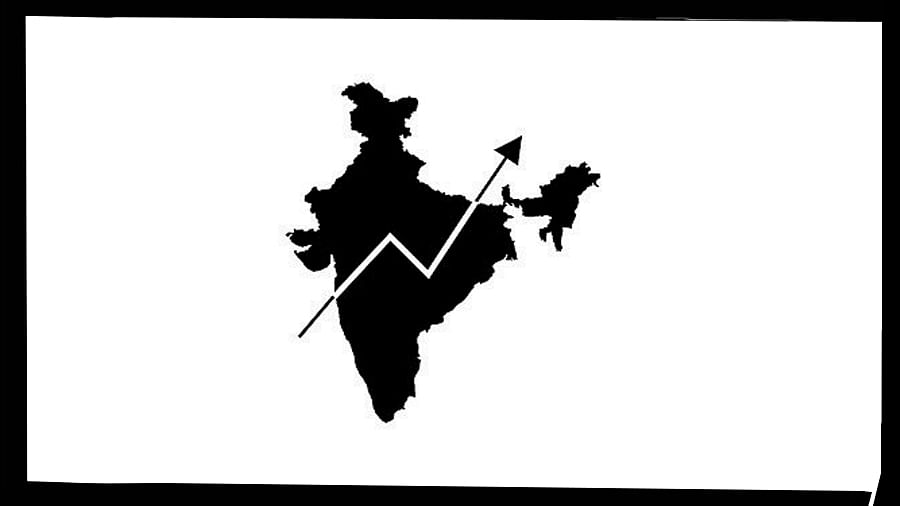
Credit: DH Illustration
India is currently in the spotlight as one of the world's fastest-growing large economies, aiming to reach a $5 trillion economy by 2027 and become the world’s third-largest economy by 2047, after the US and China. Achieving this dream requires our collective efforts as a nation.
Making an optimistic observation to see whether we will be able to achieve our ambitions, I find that our country faces various challenges that may pose serious obstacles to achieving our goal. Let me share my understanding of a couple of the most serious of these challenges and the possibilities of overcoming them.
I would not like to list out the numerous challenges that any nation, including the so-called developed nations, is facing and will continue to face even in the future, as newer challenges will emerge with time. In my view, the greatest challenges facing India today are:
The all-encompassing corruption, including the emerging form of bribing the electorate in the form of freebees; and
The increasing communal divide resulting in the feelings of the minorities, particularly the Muslim community, that they are being discriminated against.
These are serious issues, and every citizen should be concerned about them.
Corruption
Corruption, black money, and freebees present formidable challenges deeply ingrained in our society. We don’t seem to be averse to corruption and are willing participants in this process. The corrupt evade consequences through influential connections and legal maneuvering. Are we not seeing some influential and high-profile politicians, who have been convicted for indulging in corruption, frequently getting out of jail? Worse, they are seldom disowned by their followers or the electorate. I wonder if we can ever devise a system for controlling corruption.
Freebies, particularly the ones promised by the political parties in their election manifestos, are the latest innovations of the fertile minds of the manipulators of the electoral process. Their success in some states has made it attractive to most other political parties. Political parties justify freebies by quoting the provisions contained in Chapter IV (Directive Principles of State Policy, Articles 36 to 51) of the Constitution and the duty of the State to help the poor and disempowered sections of society. What is deliberately concealed is the most important provision contained in Article 37, which, before all other articles in Chapter IV, mentions that “……it shall be the duty of the State to apply these principles in making laws.” The stated objective/justification for the pre-election announcement of freebies cannot be contested by anyone, as it is to help the poor and empower the disempowered in society. But these objectives are to be kept in view by the state while making laws, which can only be a post-election activity of the State.
In a democratic setup, it means that the concerned legislature will have the opportunity to discuss all the aspects of providing such benefits, including the financial capacity of the State to fund such measures. In fact, the central and state governments have been implementing such welfare schemes right from the beginning of the Constitution. Political parties, therefore, cannot justify the announcement of freebies before the elections as having a constitutional mandate. This is a strategy invented to garner political advantage in the hustings. It is good that some political parties have started to realise the adverse effects of such freebies on the state finances. And the worst is that the doles in the form of freebees dampen the resolve of the beneficiaries to fight their own adverse circumstances. Now that the matter is before the Supreme Court, one hopes that such practices will be declared unconstitutional.
Increasing Communal Divide
This is arguably the greatest challenge now before India, as we have sizeable minorities in our country. We are a secular country, and our Constitution gives equal rights to all our citizens. However, the minorities, particularly the Muslim minority, which is the largest minority (about 14% of the population), seem to be feeling alienated and discriminated against. Concerns about some of the legislation, like the abolition of Triple Talaq, CAA, and abrogation of Articles 370 and 35A, from the Constitution and the proposed Uniform Civil Code, persist among the Muslim community. They have been expressing their concern in this regard both privately and publicly. It is a serious matter and needs to be addressed urgently.
Our experience so far indicates that political parties have tried to create vote banks that are mostly based on specific castes, communities, and religions. There are not many vote banks that are based on political philosophies or ideologies at present. This doesn't augur well for a healthy democracy. One hopes that our electorate will exercise their franchise carefully and not become vote banks for any political party. Though there's some hope in this regard, it is important for the electorate not to mortgage its interests/future by becoming a vote bank for any particular political party.
Coming back to the apprehensions of the Muslim community, I can only say that their apprehensions need to be addressed immediately, as these are likely to be exploited by the unsocial elements and can lead to serious law and order situations in some parts of the country. In my experience, people from all communities generally have cordial relations with each other and want to live peacefully and in harmony. Unsocial elements should not be allowed to disturb this harmony. It is also important that both the ruling party at the Centre and the Muslim community introspect, and jointly find a solution to address thesse concerns.
We need to understand that India can become a developed nation only if the fruits of development are shared equally by everyone.
(The writer is a retired IAS officer)